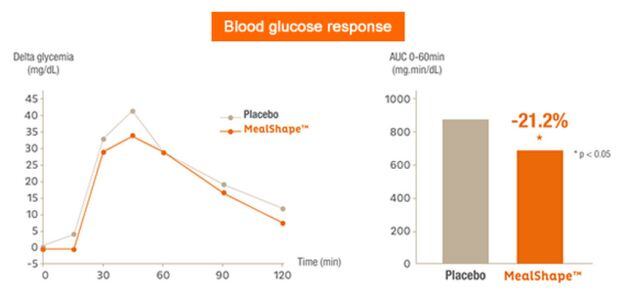What is MealShape?
MealShape is a food-grade cinnamon extract developed by a French firm called Dialpha that’s standardized in polyphenols and has proven acute effects on blood sugar levels. Ceylon cinnamon is used because unlike cassia cinnamon, it doesn’t contain high levels of coumarin, which can pose health risks with excessive consumption as it has anticoagulant properties.
How does it work?
MealShape delays the digestion and the absorption of carbohydrates by inhibiting the activity of alpha-amylase, a pancreatic enzyme that breaks down starch into sugars, so you can eat a starchy meal and it’s blocked from breaking down into simple sugars.
The recommended dose is 2 x 500 mg or 1 g per day, so you could take it all before one big starchy meal or have one before breakfast and one before dinner, for example. Ideally you’d take it 20-30 minutes before a carb-heavy meal.
What evidence do you have that it does what it says on the tin?
After several preclinical trials showing a strong effect on postprandial glycemia in rodents, MealShape was studied in a small randomized, cross-over, double-blind, and placebo-controlled trial on healthy humans - female and male - who were given MealShape or a placebo (2 capsules of 500 mg) before eating white bread after an overnight fast. Glycemia and insulinemia were measured over two hours after the bread was consumed.
The paper has not been published yet, it’s being submitted for publication now, but it showed that postprandial glycemia was significantly reduced in the MealShape group by 21.2% (Area Under Curve 0-60 min *p<0.05) without affecting insulin response. MealShape was also well tolerated and no side effects were reported during the study.
Because the sugar gets into the bloodstream more slowly, the insulin doesn’t have to work as hard.
What claims can US firms make on pack in supplements and in foods containing MealShape?
In future we’re planning to do another study looking at weight management effects, because if the body is less able to break down starches into sugar for further digestion and absorption, it could stop that sugar being stored as fat. But today, we’d say that claims along the lines of ‘helps maintains blood glucose within the normal range’ are supported by the evidence.
Where do you think its potential lies?
We think supplements probably have the most potential to start with - you can also combine it with chromium [which has similar effects] - but MealShape can be incorporated into foods; it’s been tested in a French baguette in preclinical trials and the results demonstrated a significant dose-related effect: the glycemic index of bread containing 0.5% MealShape decreased by 30%.
What about the marketers that say popping pills before eating carbs is not going to foster healthier eating patterns, and that consumers aren’t thinking about blood sugar unless they are diabetic?
Of course we know we should change our diet and eat more healthily, but we’ve been telling people to do that for years and diabetes rates are still rising, because people don’t want to change their habits.
As for blood glucose, when I talk to R&D people about MealShape, they understand it, but in the general population, while people understand messages about maintaining a healthy heart, weight or joints, they don’t think about their blood sugar in the same way, so it can be a challenge.
By the time they know they have a blood sugar problem, they may already have diabetes, and then they are put on drugs.
However, we think MealShape will interest people looking for natural solutions to manage post-meal blood glucose without side effects. We’re only just starting to talk to the market about it now but so far we’ve had very positive feedback.

